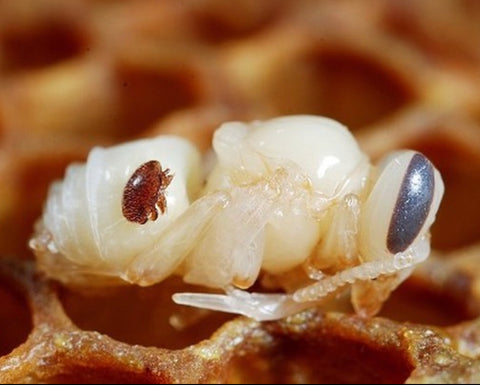
Threat to the Australian bee and honey industry.
Varroa Destructor. The name itself sends shivers up one's spine & you would be correct in imagining a monstrous sci-fi creature rearing up to devour earthlings and any living creature on our planet.
This imagery is perhaps not so far-fetched as this mite does endanger a crucial link in our ecosystem of life - the European honey bee. And we all know that bees, already globally threatened, are essential pollinators and therefore part of our food source and crop production.
We spoke with Michael Howes, our partner artisan from Australia's Manuka Honey at Tyagarah Apiaries, as to the impact on his bees and hives. Fortunately, Michael's team of beekeepers are super vigilant and the hives are untouched at this stage.
We would like to share some insights with our tribe of followers to better understand why this tiny mite is such a massive deal.
What is it?

(Image from The Australasian Beekeeper magazine instagram @theabkmag)
The size of a sesame seed, about 1.5mm, the reddish-brown Varroa Destructor Mite (hereon will refer to simply as the varroa mite) live off the heamo-lymph and fatty tissue of the European bees, usually in a place between the abdomen and thorax junction area, weakening them so they cannot do their work. Even worse, they invade the heart of the beehive to feed and reproduce on larvae & pupae in the developing brood, not just debilitating them, but causing malformations as well.
If you imagine a giant tick, the size of your fist, sucking out your bodily fluids, that's what's happening to the poor bees!
The infectious bees transfer to others very quickly and if left untreated, the pest will kill any beehive it infests - including all feral and untreated bee colonies. The drone bees are the key carriers as they move from hive to hive and even between apiaries.
When did it last enter Australia?
Australia is the last bastion to resist the Varroa mite as we have such diligent and strict quarantine requirements in place at our ports to protect the Australian honey bee industry.
Michael says, "The potential financial cost to Australia is estimated to be $70 million per year, if the mite becomes established. About one third of Australia's food production relies on bee pollination (almonds, avocados, apples, and more)."
The Varroa Destructor mite was detected in surveillance hives in Newcastle Port at the end of June 2022. According to ABC news, it has now spread about 400 kms from the port to around 40 properties across New South Wales.
What can you do?
"The sadness in euthanising bees as a result of the Varroa mite landing at the Newcastle Port a couple of weeks ago, is overwhelming. From fires to floods, to this deadly parasite - our thoughts are with other beekeepers as we face yet another trying time".
If you are an unregistered beekeeper, register online the NSW government website to let them know where existing hives are, enabling ease of contact should others around your zone be infected.
As the Varroa mite does not harm the native bee, you need not worry they will be infected - however, your vigilance in detecting them and advising authorities will prevent the destruction of the vulnerable European beehives!
If you do detect any suspicious mites, contact the department via email:
hive.location@emergency.dpi.nsw.gov.au or call the Exotic Plant Pest Hotline 1800 084 881.
From the bottom of our hearts, thank you for reading this & please spread the word.

